Thanks for your support! If you make a purchase using our links in this article, we may make a commission. And, as an Amazon Associate, I earn from qualifying purchases. See the full disclosure here.
Do Tankless RV Water Heaters actually provide endless hot water? Tankless RV water heaters do provide endless hot water, but the wise veteran RVer will always want to know the fine print, exceptions, and details before making a $500-$1,000 purchase like this. On an essential component like an RV water heater, finding the perfect fit requires some research.
RV tankless water heaters are a great upgrade from the traditional tank versions but aren’t suited for every camping style. We’ll show you what makes them so great, the best brands, and what the realities are of an RV tankless water heater.
Do Tankless Water Heaters Always Have Hot Water?
Tankless water heaters always have hot water and live up to their reputations. They work by running incoming cold water through a long pipe with many bends. As the water makes its way through the line, the component’s heat source warms up the tube, raising the temperature of the water. When the water reaches the sink, shower, or washing machine, it’s at the ideal temperature.
Like RV tank water heaters, tankless versions need to be preset to a specific temperature. They come with a wireless controller that you can mount on your interior RV walls, but you don’t want to adjust it constantly. When the RV tankless water heater’s in use, you won’t be able to change the device’s temperature. If you and your camping companion have different temperature preferences, find a good middle ground that you both like and leave it there.
RVers, especially boondockers, love the idea of having instant hot water and taking a long relaxing shower. Motorhomes or travel trailers with 6-10 gallon water heaters lose up to 2 gallons per minute (GPM) as it climbs to the right temperature. However, people often forget about their grey tank’s storage capacity. As a result, that 30-minute shower can come to an abrupt end when the water starts backing up.
Three Reasons a Tankless Water Heater is Worth It in an RV
Despite all of the hype, tankless water heaters aren’t worth it in all RV situations. As Nate and Melissa explain from Less Junk More Journey (learn more about them from our September 2021 FREE digital magazine, RV Camping Magazine), weekenders and part-timers may find their six or 10-gallon tank water heater a better fit.
1. Tankless Water Heaters Provide the Best Return on Investment
Seasonal and full-time RVers can get the best return on investment with a tankless water heater. Since the majority of month-to-month campground sites have metered electricity, you’ll see significant savings on the electric bill. Tanked water heaters constantly keep the water heated, so it’s ready to use whenever it’s needed. Tankless versions use an electric intermittent ignition device (IID) to heat the water pipe when activated by the hot water faucet.
2. Tankless RV Water Heaters Can Reduce Weight in Your RV
Tankless water heaters help you reduce weight in your RV. Some articles show you how to skim a few pounds here and there to reduce a significant amount of weight collectively. By switching to a tankless water heater, you could reduce your RV’s Gross Vehicle Weight (GVW) from 50-83 pounds.
The weight of one gallon of water is 8.34 pounds. Therefore, a six-gallon RV water heater tank carries 50.04 pounds, and a 10-gallon tank holds 83.4 pounds of water. When people calculate their total vehicle weight, they often forget to include their holding tanks and rarely include the water heater.
What would you do with that extra weight? You can comment below or join the discussion with our RVBlogger Friends on Facebook on RV Camping for Newbies. Learn how rookie and veteran RVers handle the weight question and other issues in the RV World.
3. RV Tankless Water Heater Water Flow
The average tankless water heater has a water flow rate of six GPM. Models range between 4-10 GPM. If you open the hot water faucet to a trickle, the device may not turn on. You’ll need to open the tap enough to activate the water heater. Each water appliance has a particular gallons per minute average.
- Bathroom/Kitchen sink- 1-2 GPM
- Dishwasher- 2-4 GPM
- Shower- 1.5- 3 GPM
- Washing machine- 3-5 GPM
Have you ever been in the shower, and someone else flushed a toilet, turning your soothing shower into a scalding inferno? When you overtax an RV tankless water heater, your spa-like shower turns into a polar rainstorm.
With some quick analysis and a few changes, like running the dishwasher at night instead of the morning, you’ll reduce your hot water needs during those high use times. Therefore, you can save money by purchasing a smaller GPM tankless water heater instead of the 10-16 GPM version.
You’ll also want to connect an RV adjustable water pressure regulator to the campsite hookup. If the campground has low or high pressure, it can prevent the tankless water heater from working correctly. Adjustable water pressure regulators allow you to set the incoming water flow pressure to your needs instead of a manufacturer’s preset. Learn more about them in our discussion on the 6 Best RV Water Pressure Regulators and see which one we use on our Gear page.
Is it Easy to Replace an RV Water Heater With Tankless?
Even though the device comes self-contained, it’s not easy to replace an RV water heater with the tankless feature. Every model comes with a step-by-step instruction manual on connecting the electrical and propane lines, but there’s more to it. RV tankless water heaters are generally smaller than their tanked counterparts. To secure them correctly, you’ll need to add wood or aluminum support braces.
Another issue is many don’t come with exterior doors. One of the biggest realities of the RV World is that there’s no such thing as standardized parts. Even before the RV industry’s backlog problems, you could find different water heater brands in the same travel trailer series. If you find the right exterior door, you must ensure it’s the correct color: white, beige, brown, or black.
Many do find the complexity of the installation worth the effort due to the functional longevity of an RV tankless water heater. Typically, a tankless unit lasts up to 20 years, while tanked water heaters need replacement after 10-15 years.
Do Electric or Propane Tankless Water Heaters Work Better?
It boils down to your RV lifestyle needs and wants if an electric or propane tankless water heater works better for you. Each version has certain advantages that make them worthy of your shortlist.
Electric RV Tankless Water Heaters
Boondockers will find electric RV tankless water heaters solar system friendly since they use up to four watts. Electric versions take a few seconds longer to get up to temperature (between 3-5 seconds) but nowhere near a tanked counterpart. Installing a tankless electric type is easier since you don’t have to connect the gas line.
High altitudes won’t be an issue if you’re camping in the mountains because you’re using electricity, not burning propane. Electric tankless systems are more efficient, but you’ll find that they exist in the smaller gallon per minute sizes.
Propane RV Tankless Water Heaters
On the other hand, gas-powered tankless water heaters heat your water faster and come in the largest GPM models. In addition, if they have a condensing feature, the exhaust is used as a secondary source to heat the water before vented. Also, to save fuel, RV tankless and tanked water heaters have an electric intermittent ignition device (IID) rather than a continuous burning pilot light. So, you don’t have to worry about that slow fuel drain as RVers did in the Classic Era (1971-1989).
RVBlogger Pro Tip on Propane Exhaust: When propane is burning correctly, it produces carbon dioxide and water. If your carbon monoxide alarm activates, that could mean something’s wrong with your propane burner. Propane produces carbon monoxide only when it’s poorly burnt. If the CO alarm’s going off, shut down all propane burning equipment and find an RV service center/mobile repair technician as soon as possible.
Electric RV tankless water heaters are about 95% efficient, and propane devices average 85% efficiency. In the grand scheme of things, only you can determine the significance of 10 percentage points. Check out the side-by-side table below for an organized chart that compares the features of electric versus propane RV tankless water heaters.
Portable Tankless Water Heaters – Perfect for Outdoor Showers
Teardropers, rooftop tent campers, and DIY #VanLifers shouldn’t feel left in the cold because portable tankless water heaters will complete your outdoor shower ideas. Many of these battery-powered electric or propane devices connect to your freshwater tank or sink faucets so you can clean yourself off after your outdoor activity adventures.
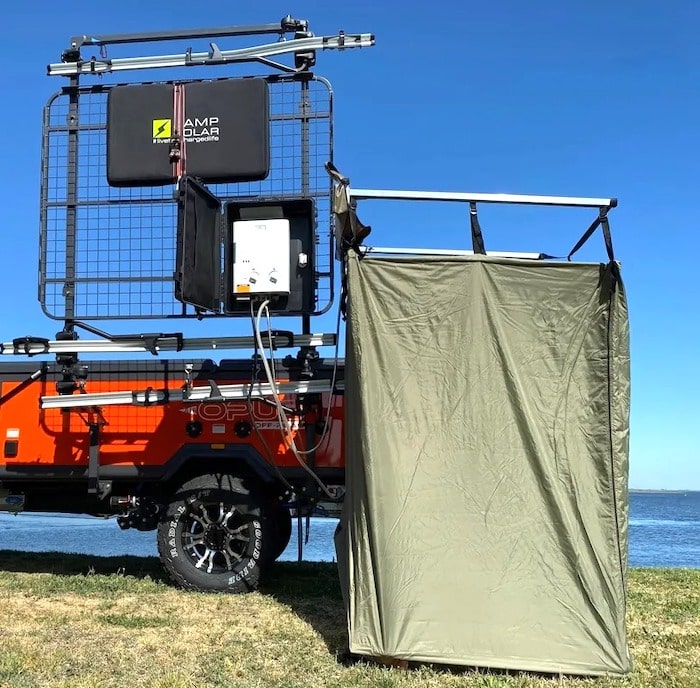
Opus Camper’s OP4 Pop-Up offers the Eccotemp water heating system as an optional feature. When this Australian RV company first entered the U.S. market, this portable tankless water heater connected to the camper’s fresh water tank, and owners had to be creative in making a private shower space. Opus Camper offers a mounting system on the hinged roof rack and a connecting tent that gives you the height and privacy for the perfect shower experience.
There are other portable tankless water heaters you can similarly use with your RV. Instead of using the two-stockpot dishwashing method, you now have all the hot water you need to clean your cookware and dishes. Use RV-friendly melamine plate sets instead of paper or foam for your meals. Even make that quick cup of tea without turning on the propane stove (we know, that’s blasphemy in the tea world, but you’re camping).
RV Tankless Water Heater Pros and Cons
RV tankless water heaters have their pros and cons. Based on what we’ve already discussed, here’s how their benefits and burdens line up:
| Pros | Cons |
| 1. Bigger models keep up with multiple faucet usage 2. Instantly produce hot water 3. Last longer 4. Reduces gross weight 5. Smaller than tanked 6. Use less energy | 1. Affected by water pressure 2. Complicated installation 3. Exterior doors sold separately 4. Higher purchase price 5. Long showers can overflow grey tanks 6. Not ideal for part-timers or weekenders |
Electric Versus Propane
| Electric | Propane/Kerosene |
| 1. 93-95% Efficient 2. Altitude neutral 3. Solar system friendly 4. Smaller GPM units 5. Uses up to four watts | 1. 85% Efficient 2. Exhaust heats water with condensed feature 3. Instant hot water 4. Intermittent ignition device (IID) 5. Larger GPM units |
What are the Best Tankless RV Water Heaters?
Finding the best tankless RV water heater for you and your family should start with a list of your collective requirements.
- How many water features need hot water at high points? (sink, shower, washing appliances)
- What are your off-grid camping requirements?
- How often do you set up in high elevations?
- Which RV lifestyle fits you best: weekender, part-timer, seasonal, or full-timer?
- Would you define your showers as long spa experiences or quick bootcamp clean offs?
- How accessible is a dump station to empty your grey water tank?
Once you have answers to these questions, here are the brands of tankless water heaters that are the most popular in the RV world.
1. EccoTemp Portable Outdoor Tankless Water Heater
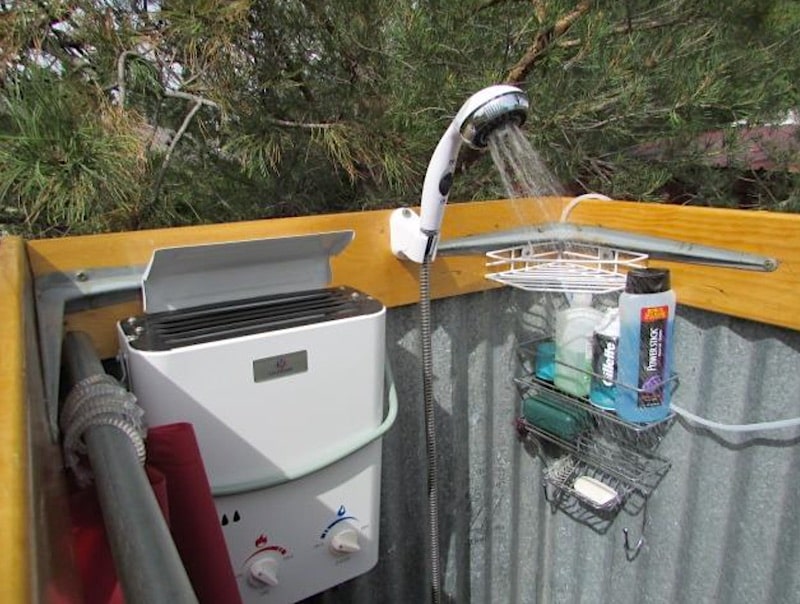
EccoTemp started as a family business in Summerville, SC, in 2004. Today, you can find this top brand’s portable tankless water heaters, whole home, and electrical products in the U.S., Europe, and Australia. The company wants to create eco-friendly products to improve their customers’ lives. So you’ll find their devices in Home Depot, Walmart, Sam’s Club, Camping World, and over 2,000 other retailers.
2. Fogatti Tankless RV Water Heater
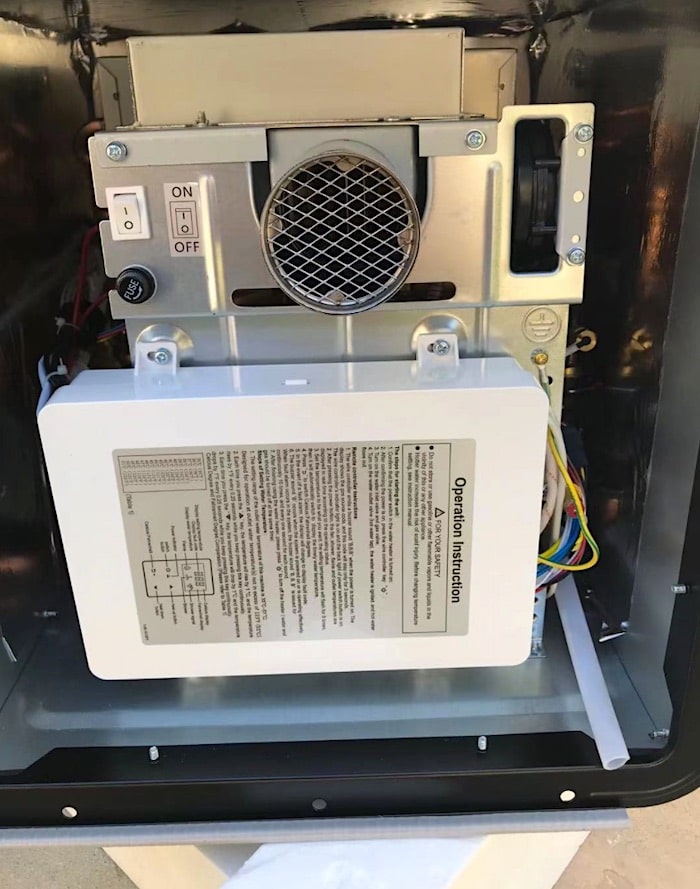
Fogatti Group is a leading supplier of innovative electrical technology and services in the global market. Their goal is to continue to support their customers throughout the lifecycle of their water heater products through their support services. The company sells the RecPro and Fogatti RV series tankless water heaters through several retailers.
3. Furrion Tankless RV Gas Water Heater
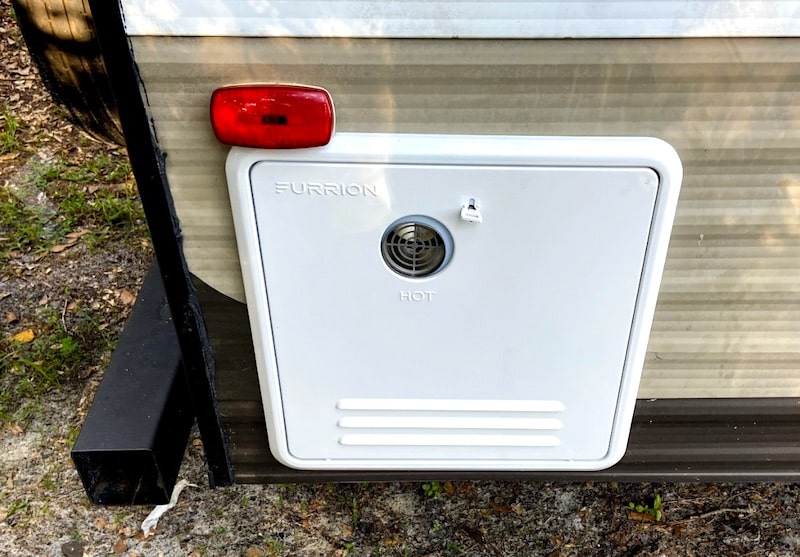
Now that Furrion is a division of Lippert, their high quality has the financial backing it deserves. The Furrion RV tankless water heater comes in either black or white. It puts out 2.4 GPM and uses propane as a heating source. The digital controller is user-friendly and comes complete with an external door.
4. Girard Tankless Water Heater
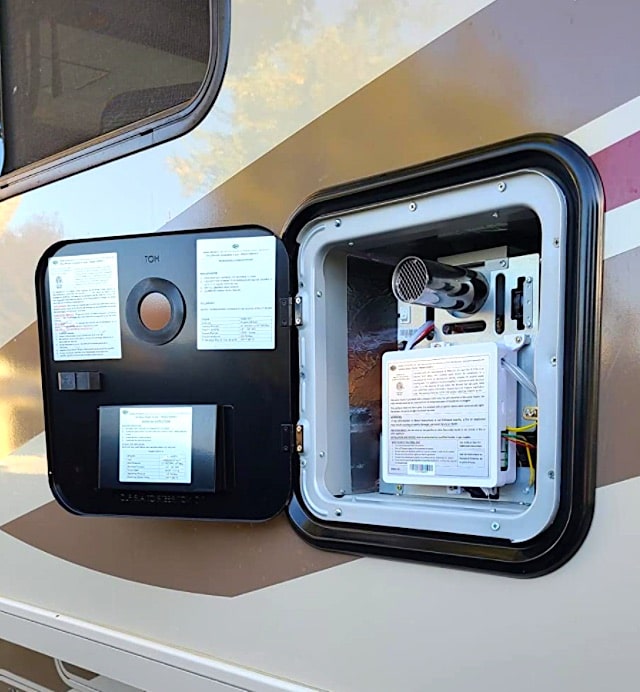
Girard was the company that created the tankless water heater in 2009. The company’s new GSWH-2 is the most Green RV tankless water heater they’ve released. Some of the highlights include the ability to add cold water to the desired temperature, no unique LP line or special plumbing required, freeze protection, and a microprocessor that monitors water temperature efficiency.
5. Suburban Gas and Electric water Heater
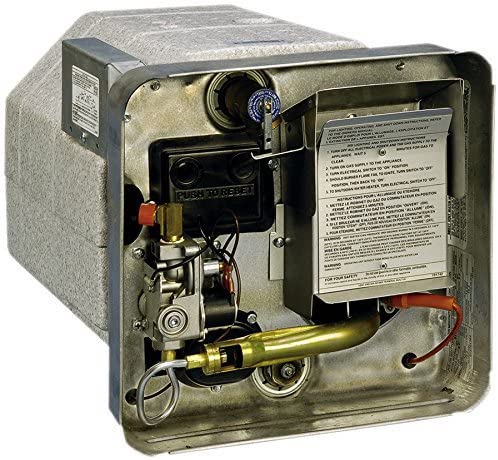
Suburban became a division of Airxcel in 1997. In September 2021, Airxcel joined the Thor Industries Family. This Dayton, Tennessee company dates back to 1947 and has become a household name in the RV Industry. Suburban’s tankless RV water heaters come in 4, 6, 10, 12, and 16 GPM models that use electric and propane. Suburban is the gold standard when it comes to air and water heating devices.
Conclusion: Can an RV Have a Tankless Water Heater?
Some RVs have tankless water heaters installed directly from the manufacturer. There are some motorhomes and travel trailers that offer it as an option or a standard feature. You could go through the over 200 RV manufacturers’ websites to hunt them down, or subscribe to RVBlogger’s YouTube Channel and let us do the work for you. Every Sunday, we feature a new video where we walk through a set of RVs by the most popular topics new and returning RVers are looking for in their next coach.
RV tankless water heaters are one of the many ways you can upgrade your existing RV. RVBlogger offers many avenues you can explore to make your coach a home-on-wheels. Check out the Renovate Your RV and RV Gear sections of our FREE digital magazine, RV Camping Magazine. We feature the best guest writers who show you how they remodel or restore their favorite RV. In addition, the NRVTA offers you great techniques for RV preventive maintenance and repair issues and other fantastic articles.
If you have other RV plumbing questions or want to learn more about all things RV, our RVBlogger Website has hundreds of articles that answer many of the questions the RV Community wants to know. You can further discuss your query with thousands of RVBlogger Friends on our Facebook Group, RV Camping for Newbies. You’ll come across RVers from all walks of life that are happy to share their wisdom with you. Finally, don’t forget to connect to our Instagram page to see how we enjoy the best destinations and gear in our adventures.
So, from Mike and Susan, thanks for reading, remember to leave your campsite better than you found it, and we’ll see you next time!

We bought the Girard in 2020. Wouldn’t be without it now. Ranks up there with our composting toilet. 2 must haves for fulltimers.